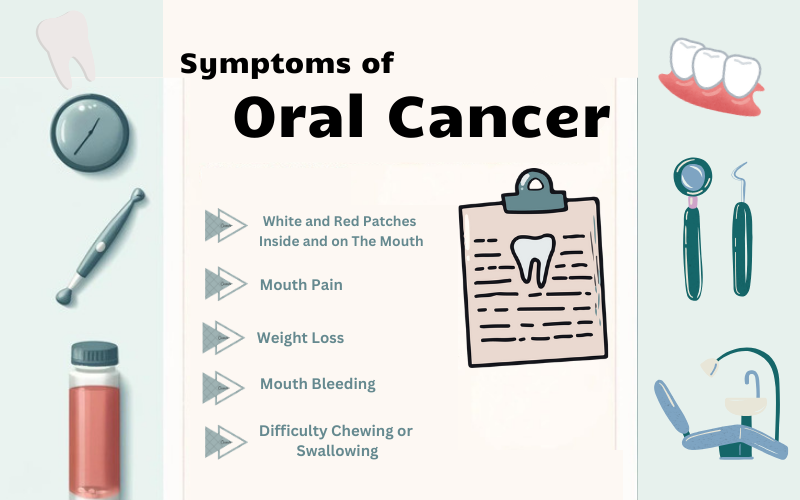Signs and Symptoms of Oral Cancer

Dr. Izadi earned his DDS from New York University Dentistry and underwent residency training in the oral surgery department at Brookdale Hospital in Brooklyn, NY. With a career spanning since 2003, he actively contributes to the development of dental board examination questions for California Dentist Licensing. He expresses... more
Oral cancer is a serious medical condition characterized by the growth of cancer cells within the parts of the mouth including the lips, tongue, gums, the floor of the mouth, and even the roof of the mouth. Recognizing the signs and symptoms of oral cancer early on can significantly impact the effectiveness of oral cancer treatment, potentially leading to better outcomes for patients.
Understanding the Symptoms of Oral Cancer
The symptoms and facts about oral cancer can be subtle in the early stages and often resemble less serious conditions, making it important to be vigilant and proactive about seeking medical advice. Common symptoms include-
- Persistent sores or ulcers- Sores in the mouth that do not heal within two weeks can be a red flag.
- White or red patches in the mouth- Unexplained white or red patches on the gums, tongue, tonsil, or lining of the mouth can indicate oral cancer.
- Lumps or thickening of tissues- Any lump or thickening in the cheek, gums, or other parts of the mouth should be evaluated.
- Difficulty swallowing or chewing- If it becomes suddenly difficult to chew or swallow, it could be a sign of oral cancer affecting the throat or esophagus.
- Changes in voice or persistent sore throat- A sore throat that does not go away or noticeable changes in the voice may be symptomatic of oral cancer.
- Loose teeth or pain in the teeth or jaw- Unexplained looseness of the teeth or pain around the teeth or jaw can be linked to gum cancer or other forms of oral cancer.
- Weight loss- Unintended weight loss can sometimes be associated with oral cancer.
Gum cancer, a type of oral cancer, specifically affects the gums and might manifest as swelling, bleeding, or color changes in the gums. Given its location, gum cancer can easily be mistaken for other gum diseases, making regular dental check-ups crucial.
Importance of Regular Cancer Tests
For those at higher risk, including individuals who use tobacco products, consume excessive alcohol, have a history of oral cancer in the family, or have been exposed to human papillomavirus (HPV), frequent cancer tests are especially important. Anyone exhibiting symptoms of oral cancer should undergo a cancer test promptly to rule out or confirm the presence of cancerous cells.
Early detection and regular cancer tests play a crucial role in the management of oral cancer. These tests often involve visual examinations and may include more comprehensive diagnostics like biopsies or imaging tests.
A dentist can perform a cancer test during an oral examination, looking for any abnormal signs that might require further investigation. Thus, regular visits to a dentist in Simi Valley or wherever one resides can provide not only routine care but also screenings for oral cancer.
Treatment Options for Oral Cancer
Oral cancer treatment typically involves a multidisciplinary approach. The specific treatment plan depends on the stage and location of the cancer, the patient's overall health, and personal preferences. Common treatments for oral cancer include:
- Surgery- To remove the cancerous tumor and some of the surrounding healthy tissue to ensure all cancer cells are eliminated.
- Radiation therapy- Often used post-surgery to destroy any remaining cancer cells, or as the main treatment for patients who cannot undergo surgery.
- Chemotherapy- Utilized either in conjunction with radiation therapy or alone, chemotherapy involves the use of drugs to kill cancer cells.
- Targeted therapy and immunotherapy- These newer forms of treatment target specific aspects of cancer cells or enhance the body's immune response against them.
Conclusion
Oral cancer, including gum cancer, is a significant health concern that requires awareness and education. Recognizing the symptoms of oral cancer and undergoing regular cancer tests are key steps in early detection and treatment.
If you are experiencing any persistent symptoms or are at high risk, consider speaking to a healthcare provider about a cancer test. With advancements in oral cancer treatment and increased vigilance in early detection, many patients are able to manage the disease effectively, maintaining a good quality of life.








